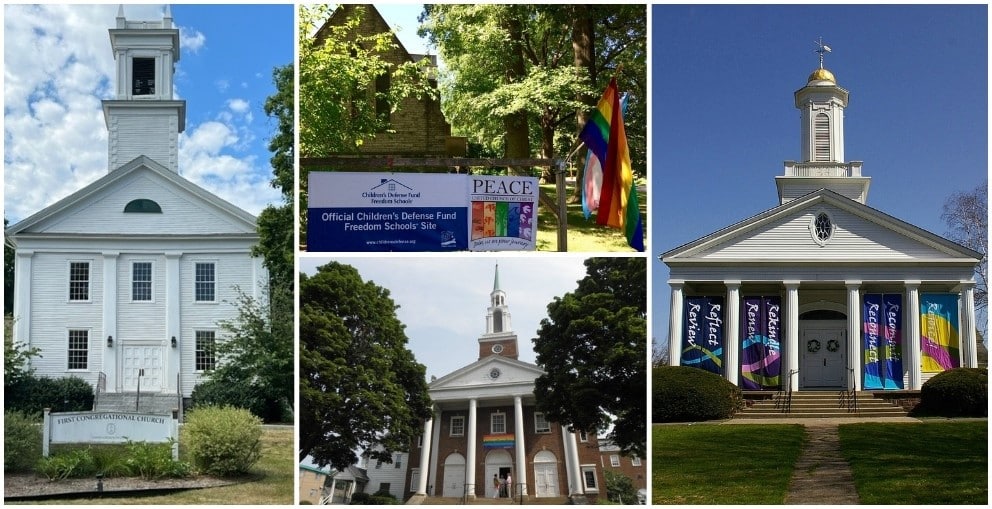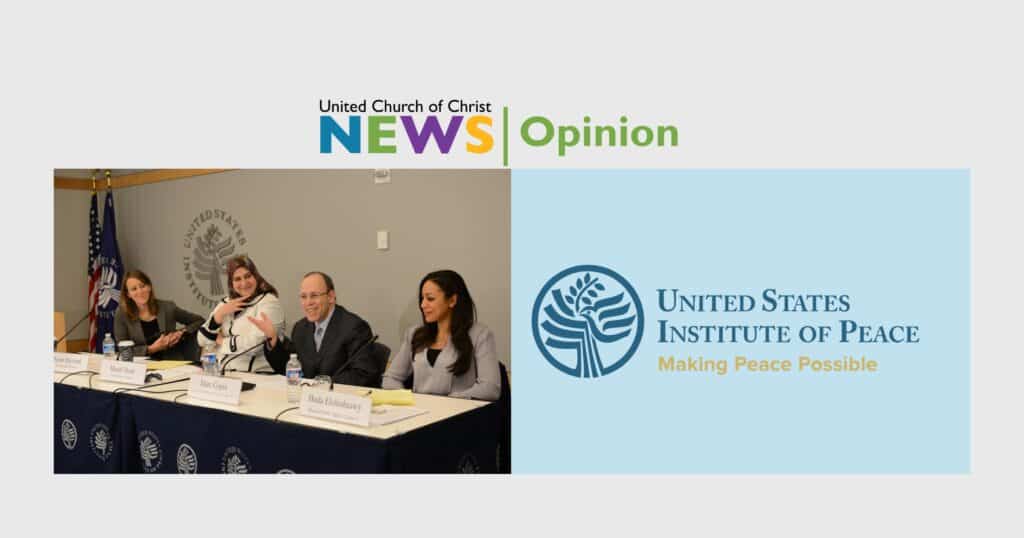Churches let go of buildings and find ways to keep on worshiping, witnessing, working
When a church becomes too small for its building, there are options.
Several United Church of Christ congregations are working on one of those options right now. In various ways, they’re shedding ownership of their sanctuaries. They’re continuing to worship and do mission work. And they’re figuring out what’s next — in many cases, with mostly older members.
- In Webster Groves, Mo., Peace UCC is selling its building. It will soon worship down the street, in the chapel of Eden Theological Seminary, while keeping up its public, justice-oriented mission.
- In Cleveland, Archwood UCC just gave its church and parsonage to a Latinx cultural arts center. The new owners are happy to have the congregation keep worshiping and feeding people there.
- In Granby, Conn., the First and South Congregational churches are uniting as a totally new church. They’ve agreed to let decisions about their buildings follow their emerging mission.
Their stories are below. Each has been years in the making.
‘A new vision’
Around the U.S., COVID-19 has added urgency to the topic. The pandemic seems to be hastening decisions that were already in the works in some churches, for reasons ranging from an uptick in online worship attendance to changes in giving and building-use patterns. The Rev. David Schoen, minister for church legacy and closure, made that point in an Aug. 8 blog post for the UCC’s Vital Signs and Statistics.
“Congregations have been challenged to creatively respond to COVID-19 with a new vision for mission, worship, technology, and community engagement,” Schoen said. Some, he said, are experimenting with “new ways and understandings of being church,” finding new partnerships in their communities, “and reinventing church space and property for missional use.”
Of course, selling and continuing as a congregation is just one option. Some of the others have made news recently:
- Thinking big. Some congregations have found new life through significant development projects. These involve planning, raising money and working with partners. St. Peter’s United Church of Christ did such a project in Louisville, Ky., as did as did First Congregational UCC in Ocala, Fla.
- Closing faithfully. Other churches have ended many decades of ministry, sold their property and given the remaining assets to a good cause. An example is the Congregation for Reconciliation in Dayton, Ohio, which donated to the Join the Movement campaign.
Churches that are giving up buildings — and keeping on going — say they, too, have invested lots of time, planning and emotional letting-go in the process.
Missouri: Minds blown
At Peace UCC in Webster Groves, the decision to sell — by vote of the congregation earlier this year — has changed everything, its leaders said.
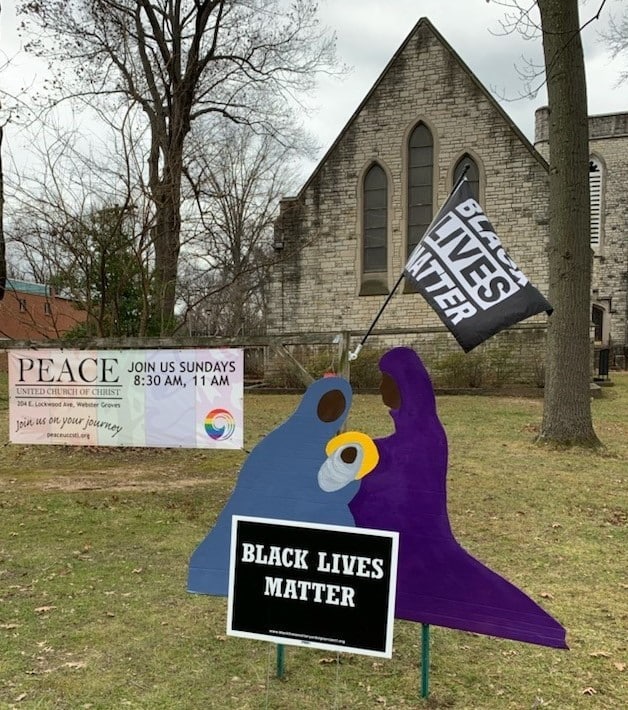
It doesn’t hurt that its 2.5-acre campus — home to the congregation since 1920, and including its current 1937 building — is now under contract to sell for some $6 million. “Within six hours of it being on the market, we had multiple offers north of $5 million,” said Suzan Pierroutsakos, who chairs the church’s Governing Body. “It is absolutely prime real estate in St. Louis County. It’s a hot commodity.”
So now, “the sky is the limit” for the congregation’s work in the community, said its pastor, the Rev. Wendy Bruner. “We’re going to have so much money. It’s mind-blowing.”
As important as the money, she said, is the fact that the church can now shift its focus. Peace’s leaders were spending about 75 percent of their time on building-related issues, she said.
The difference was already obvious when the Governing Body met in early August, even though “we haven’t yet seen a dime of money from the building,” Pierroutsakos said. “The energy in this meeting was palpable and really mind-blowing, because we are making the shift to focusing on our mission.
“There was this almost 30-minute conversation about how we can capture the energy from the past Sunday, where we had the graduation of Freedom School scholars, and how we can engage them in the month ahead until the next Freedom School. People were ready to do that work with such passion.”
Outward-facing mission
Hosting a Children’s Defense Fund Freedom School, a summer program for children and teens, is an example of how Peace UCC “has been moving from a charitable construct to systems change” in recent years, Bruner said.
Another is the weekly public “Black Lives Matter” street demonstration it has been holding since shortly after a police officer murdered George Floyd in Minneapolis in 2020. And both before and after Bruner’s arrival in 2015, the church has been involved in activities such as getting Medicaid expansion on the Missouri ballot, advocating for a living wage and campaign finance reform, and doing community-organizing work through the ecumenical Metropolitan Congregations United.
Those ministries don’t require the church to own property. “We don’t have to have a building to march or get signatures or go to the Missouri State Capitol in Jefferson City,” Bruner said.
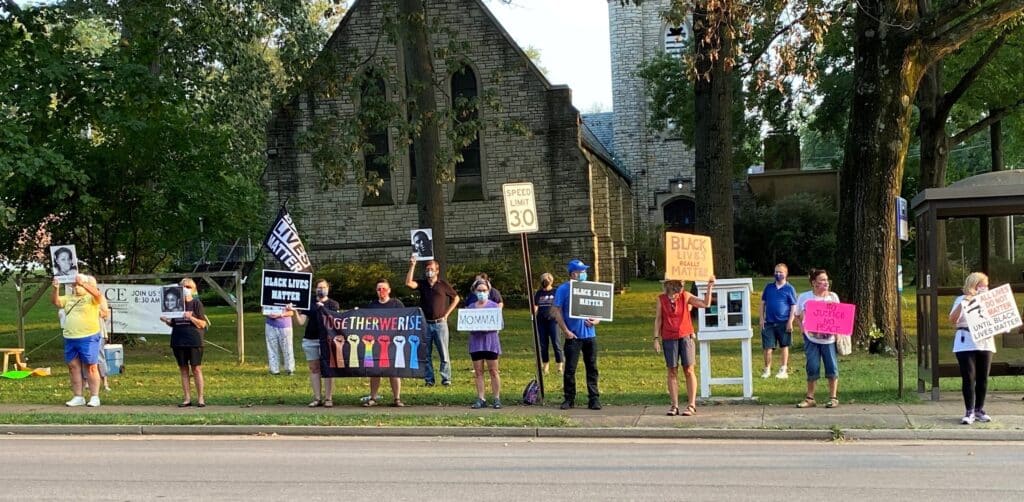
‘Church is the people’
The road to selling the campus including “turning points” along the way, Peace leaders said. Among them were:
- Attending a Partners in Building conference in 2018. “We wanted to know what to do about our property,” Bruner said. Presenters from the UCC Church Building & Loan Fund helped the congregation see that “your building doesn’t drive things; your mission and vision drive things,” she said.
- The congregation’s decision in early 2020, after some strategic planning, to change its budgeting assumptions. As Bruner described it, “staff would become a fixed cost and the building would become a variable cost.”
- A 2020 meeting where “we really engaged around this mind shift,” said Debbie Gregg, who chaired the Governing Body at the time. “… We were intentional about, ‘the church is not the building, church is the people.'”
- “A retreat that we had in the park in the fall of 2020 where we suddenly ended up writing on those big Post-It notes about what is the church,” Pierroutsakos said. “Before we knew it we were talking very passionately about what the congregation and the church is, and how it has nothing to do with the building. I think that was a paradigm shift moment for the Governing Body and the church.”
- A congregation-wide “dreaming process” about the future, starting in January 2021.
- Mutliple positive meetings with Eden Seminary President Deborah Krause. Gregg said Krause was open to possibilities, including the use of Eden’s chapel, and asked, “What could partnership look like?”
- Studying the book “Beyond Resistance: The Institutional Church Meets the Postmodern World.” Its author, UCC General Minister and President John Dorhauer, met with the congregation via Zoom in December 2021 to discuss what mission means.
‘Difficult work’
And there were moments when “people freaked out,” Gregg said. The Governing Body listened. “Someone said, ‘We need to do a capital campaign, that’s the answer,” Gregg recalled. “Or, ‘I grew up here, I had kids here, I want to be buried here.’ Or, ‘We don’t know what’s going to happen. We need to take more time.'” But the process moved forward in 2021 and 2022, involving 21 meetings of the congregation and its various groups over 14 months. “It was intense,” Gregg said.
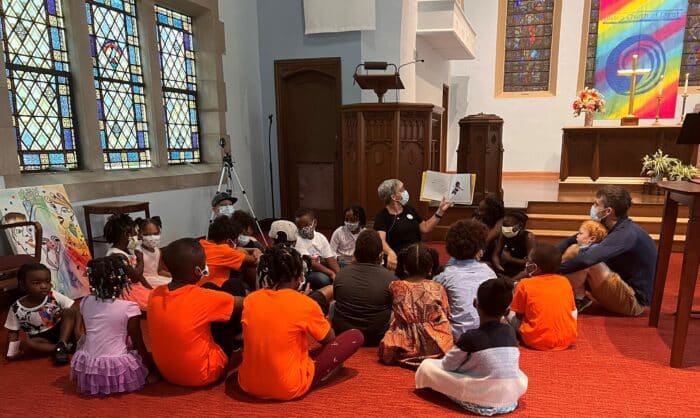
Even at the spring 2022 meeting where the congregation voted to sell, two other motions were made. Both would have kept the building. One was for a capital campaign. The other involved an educational venture. Both were defeated. The motion to leave the campus — phrased as a partnership with Eden Seminary that would involve moving there — “was overwhelmingly passed,” Gregg said, with about 90-percent support among some 100 members voting.
The congregation and Eden already have a century-long relationship. Helpfully, Bruner said, the chapel happens to have architecture that’s very similar to that of the familiar old Peace UCC building. She said the weekly Black Lives Matter demonstrations can move down the street with the congregation. So can next summer’s Freedom School.
And while the congregation is now freer to concentrate on mission instead of property and look to the future, there is still wrap-up work to do at the old site. The new soon-to-be owner hopes to build multifamily housing there — which means the church building may be demolished. “We are making efforts to salvage the stained-glass windows and be responsible in our efforts to recycle materials in the building,” Bruner said. “It is difficult work, to be sure.”
Cleveland: Big donation
In the racially diverse Brooklyn Center neighborhood on Cleveland’s West Side, a July liturgy, ribbon cutting and dinner formally celebrated something that had already happened.
Archwood UCC, in its 203rd year as a congregation, had donated its 1929 church building and pre-1900 parsonage to Julia de Burgos Cultural Arts Center. Leaders of both said the transfer of the building, by quit-claim deed on March 23, was a welcome solution to both their needs.
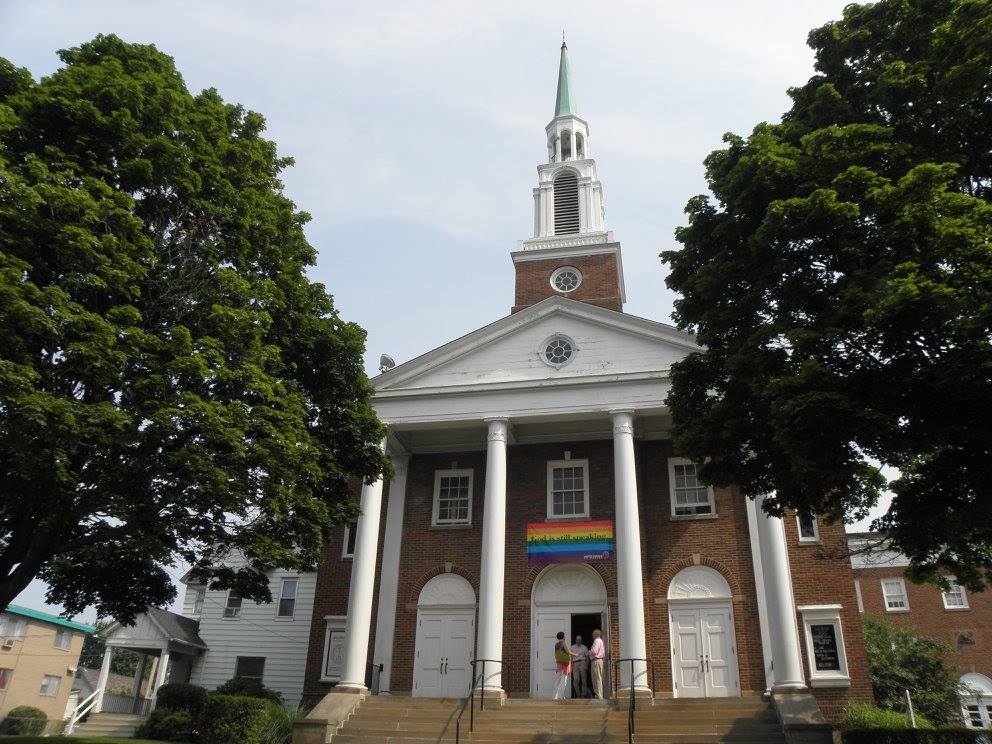
The congregation – though active in feeding the community – had grown too small for the 20,000-square-foot main building and the 1,700-square-foot parsonage next to it.
And the arts center – a tenant there since 2018 and at other locations before that – wanted plenty of room to grow. Working largely with young people, it is “devoted to preserving, educating, and promoting Latino heritage through the teaching and practice of history, culture, the visual, performing, and literary arts.” Its namesake was an early 20th-century poet and an activist for Puerto Rican independence and civil rights.
Assessing options
The congregation’s journey to donating the building had begun seven years earlier, when it enrolled in the UCC’s New Beginnings Assessment Service. The church had more than 1,000 members back in the mid-20th century, before interstate highways carved up its neighborhood. It had an upswing in energy and membership as a newly ONA church in the 1990s, but “our congregation had become significantly smaller over the past 20 years,” said the church’s moderator, Judy Schumann, a lifelong member.
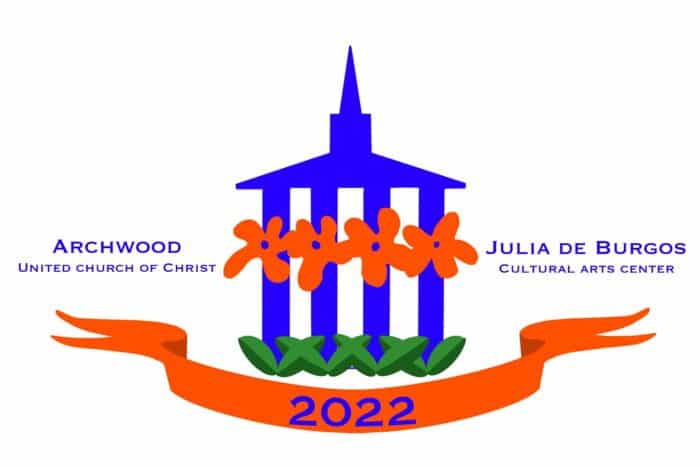
“How could we continue our ministry and help our neighbors when our membership and financial resources were not what they had been? What was the next new thing that God was calling us to do?”
It learned, through New Beginnings, that “the mission itself was pretty clear,” Schumann said. “We wanted to continue to serve our neighborhood in significant and timely ways. We felt called to further develop our ministry around issues of food insecurity. But what else could we do and how could we make use of one of our best resources – our huge, historic building, [which] was definitely being underused?”
Real estate analyses showed that the market did not regard Archwood’s real estate as a hot commodity. “It was at that time that we began to explore the somewhat radical idea of eventually giving the building away to an organization that would be able to make use of this resource and use it to serve the community,” Schumann said.
The local Metro West Community Development Organization suggested the church connect with the Julia de Burgos Center — which then began renting space at Archwood. It turned out to be a good match.
‘Life in the building again’
“It feels as if this has always been our home,” said Letitia Lopez, the center’s executive director. “And now we are so very grateful to call this beautiful neighborhood gem our forever home. From the moment we were introduced to this congregation, we knew that this was the right place and fit for us. We were welcomed in – not as tenants, but as partners in this journey that has led us here today.”
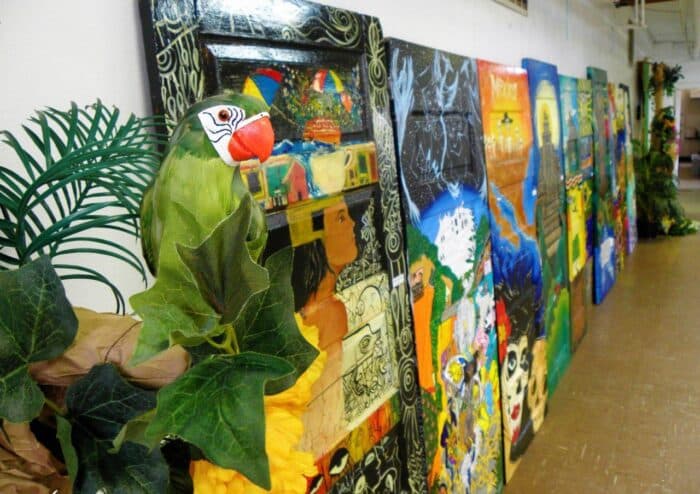
Lopez said the center’s programming has grown “from two programs and two signature events each year to over 10 programs, dozens of workshops and six signature events annually. … What was once the parsonage is now a home for our artists, where they can showcase their art, create in one of four studio spaces and develop their teaching skills by hosting workshops and talks. Last year alone we were able to directly support 38 artists in that space.” And the former church gym is now a dance studio with mirrors and ballet barres.
The church remains active – not only with worship each Sunday, but also with a low-cost produce sale in the basement twice a month and connections with other community organizations. It contributes meals, for example, to Denison Avenue UCC for its varied programs.
And, meantime, Archwood’s people — as they prepare again to discern what the next new thing might be — are glad for the historic building’s new vitality. “There is life in the building once again – not just on Sunday mornings,” Schumann said.
Connecticut: “1 + 1 = 1”
There weren’t always two Congregational churches in Granby, Conn. In the 1870s, a few dozen members of what is now First Congregational UCC left that church and formed South Congregational UCC.
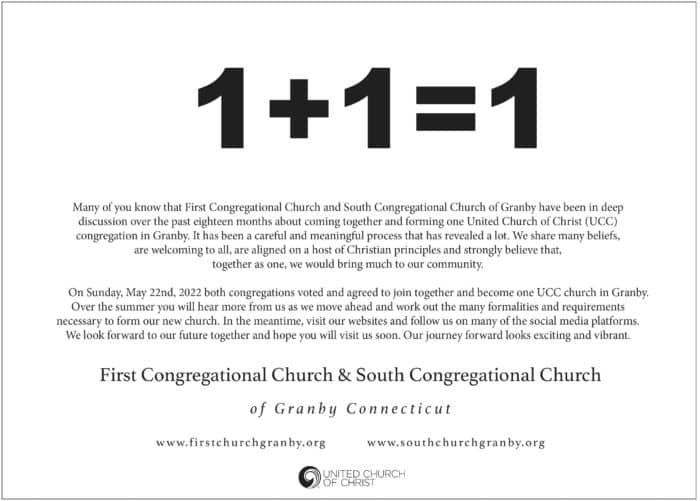
But whatever doctrinal or other rifts led to the split are no longer visible. For decades the churches have shared summer worship services, youth ministry, mission trips and more. They have similar ministries in food equity.
So on May 22, 2022 — after much study and conversation — each congregation voted to “combine” with the other “to form a new UCC church in Granby.” “We are not merging,” said Rebecca Sielman, South’s moderator. “We are creating a new church together.”
Leaving decisions about their two campuses for later helped the unity decision to move forward, their moderators said.
‘Why not?’
Besides their history of working together, membership declines at both First and South were a factor in getting them talking in the first place. “In a sense, it’s in response to what’s going on in the external environment — the overwhelming trend of decline in mainstream churches,” Sielman said. “But there’s also a certain amount of, ‘Why not?'”
“Five years ago, the senior ministers, moderators and assistant moderators began meeting regularly on how can we do more collaboration,” said First Congregational moderator Bob Giles. “As that wore on, it became more and more apparent that — as both churches are struggling financially and otherwise – could we come together and make something stronger?” By three years ago, “we started talking seriously about that,” he said.
“The more we talked with each other, the harder it was to find differences,” Sielman said. “And I don’t take that for granted.”
“We are the two Open and Affirming churches in our town,” Giles said. “And both churches have been seen as community centers.”
And what about the buildings that are those community centers? “In both churches, people love their sanctuaries,” Giles said. Forcing the congregations to vote on giving up one building or the other could have derailed the process, the moderators said.
‘We’re pretty similar’
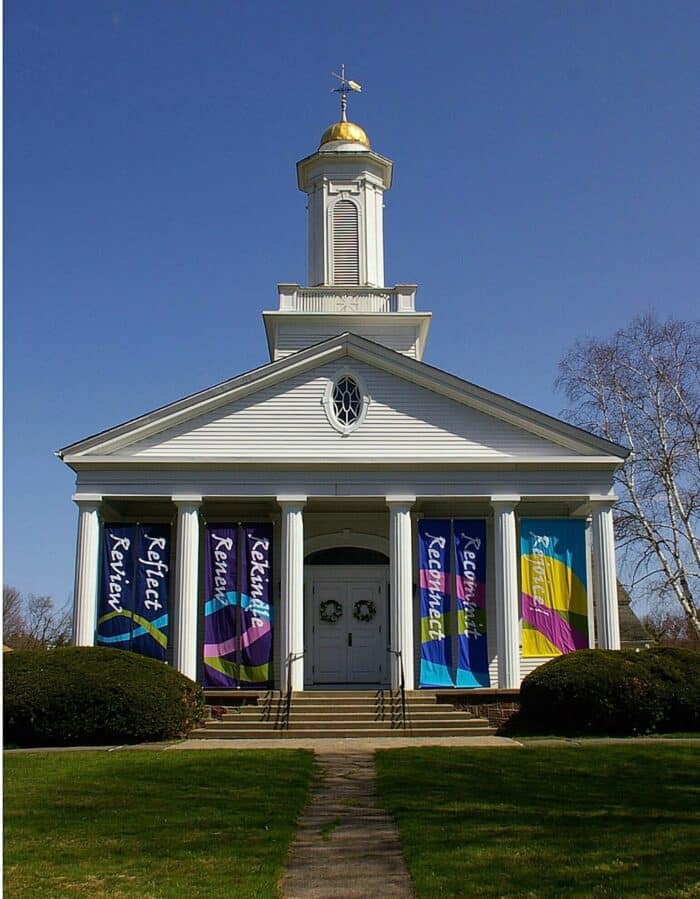
And that process was significant. That initial conversation group of six people expanded to 12. The two churches hired Claire Bamberg, a UCC minister, coach and consultant, as a guide.
“We grew to a group of 70 folks, with 35 people from each church,” Giles said. And even more members were brought into the process on working groups as “the real work started in February of 2021,” he said. These focused on areas such as programs, property, staffing, technology and communications, and the “nuts and bolts”of legal, insurance and finance matters.
“Once the working groups began working with each other, a lot of the hesitation on either side began to fall aside,” he said. “We began to see we’re pretty similar. That was when it became clearer that this is a really good thing to do. People began to look into the future.”
During that process, too, the churches began “worshiping together at one place or the other,” Sielman said, and not just in the summer. “The more we spend time in that other building, the more we get to know it, the more it feels like ours not theirs, and the more we see that the church is the people in it and less that the church is the building.”
Decision ‘off the table’
The property working group “fairly early on realized there was no need to decide which church it was going to be,” Giles said. The churches agreed to take any choice between the two campuses “off the table,” he said. The action voted by both congregations said “the new entity should receive all of the existing assets of FCC and SCC, including all of the existing real properties.”
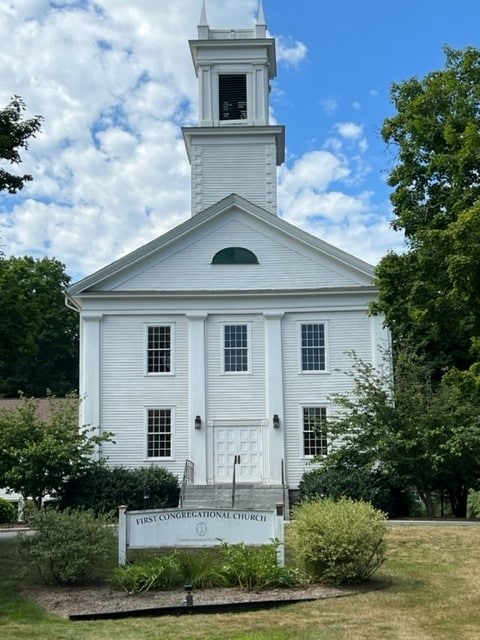
Decisions about what to do with all the assets will now wait “until we decide who we are and what we’re going to be about and have a new pastor in place,” he said.
On that point, one other matter of timing also helped, Sielman noted. Owing to retirements and calls to other churches, South and First are both arriving at their transition without pastors.
The new church will seek a designated-term pastor “who has the skill set and experience to start a new congregation and help them determine what their mission is,” Giles said. “We’re seeing ourselves much as a new church start.”
‘Don’t wait’
Those choosing to part with buildings and to keep on going said they would advise others not to procrastinate — but also to see hope in their situations.
The urgency is clear, Schoen said. “On average, a church has closed every 12 days in the UCC since 2012,” he wrote in a 2021 blog post. “Twenty-nine congregations were also reported as inactive — not worshiping — in 2019 and 2020. Adding those churches to the closed congregations, a UCC church closes or becomes inactive every 10 days. The impact of the pandemic will most likely hasten churches considering closure.”
“Start the conversation sooner rather than later,” said Sielman. “Don’t wait till you’re dying. Don’t wait till you’re desperate. Don’t wait till your hand is forced. The stronger you are, the more successful this process will be. … You have to take it slowly. If you don’t pay attention to the relationships – if you don’t let people rightly grieve the disappearance of the old, if you don’t provide time — it will not be successful. For us it took five years, and it needed all of that time.”
“Even though we’re all in different circumstances, there’s a way forward for most if not all congregations — a way that’s sustainable — if there’s energy to focus on that,” said Pierroutsakos. “If people can focus on mission rather than focusing on building ownership, there’s a way forward.”
EDITOR’S NOTE: Hans Holznagel, a member of the UCC News Team, is also a member of Archwood UCC, Cleveland.
Churches interested in exploring the future are encouraged to register for the UCC Summit, “The Space Between: The Emerging Church in a Post-Pandemic World,” Sept. 19-21, and the next Partners in Building event, Sept. 29-30, 2022.
Content on ucc.org is copyrighted by the National Setting of the United Church of Christ and may be only shared according to the guidelines outlined here.
Related News
Send a prayer shawl along to General Synod 35
There’s been a buzz about Missouri, Kansas – can you hear it? It’s more of a clicking...
Read MoreOpinion: UCC pastor and former Institute of Peace Staffer calls for action in defense of peace
Editor’s Note: The United States Institute of Peace (USIP), an independent institute founded...
Read MorePension Boards appoints David A. Klassen as its President, CEO
The Pension Boards, an affiliated ministry of the United Church of Christ recently announced its...
Read More
